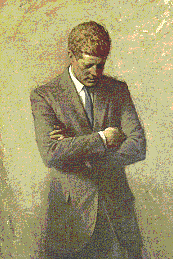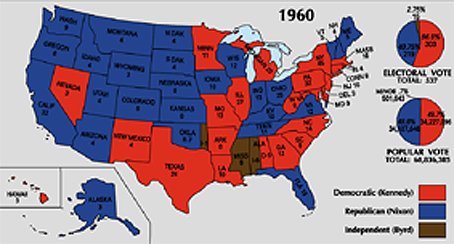KENNEDY'S NEW FRONTIER
John F. Kennedy brought energy and initiative to the presidency. His charisma and style energized Americans and made them optimistic about the future in spite of communism in the world and of poverty in America.
 The Cold War mentality, particularly the doctrine of containment, characterized the decade, as evidenced in the Vietnam War. The United States believed that it must resist communism wherever it appeared. Effects of this policy included enhanced power of the president, continued growth of the military- industrial complex, larger defense budgets, and growing deficits. The Cold War mentality, particularly the doctrine of containment, characterized the decade, as evidenced in the Vietnam War. The United States believed that it must resist communism wherever it appeared. Effects of this policy included enhanced power of the president, continued growth of the military- industrial complex, larger defense budgets, and growing deficits.
Election of 1960
By 1960s, government had become an increasingly powerful force in people's lives. Most Americans accepted government's expanded role, even as they disagreed about how far that expansion should continue.
Democrats generally wanted the government to ensure growth and stability, to extend federal benefits for education welfare. Many Republicans accepted the level of government responsibility, but hoped to cap spending and restore a larger measure of individual initiative. The presidential election of 1960s revealed a nation almost evenly divided between these divisions.
 John F. Kennedy, the Democrat victor by a narrow margin, was at 43 the youngest man ever to win the presidency. His opponent was Richard M. Nixon. In the campaign he spoke of moving aggressively into the new decade, for “the New Frontier is here whether we seek it or not”. New Frontier was a term given to the Kennedy's program of domestic legislation. The program consisted of aid to public schools, federal investment in mass transportation, and medical insurance for elderly, funded by Social Security but the legislative initiatives met opposition in Congress. John F. Kennedy, the Democrat victor by a narrow margin, was at 43 the youngest man ever to win the presidency. His opponent was Richard M. Nixon. In the campaign he spoke of moving aggressively into the new decade, for “the New Frontier is here whether we seek it or not”. New Frontier was a term given to the Kennedy's program of domestic legislation. The program consisted of aid to public schools, federal investment in mass transportation, and medical insurance for elderly, funded by Social Security but the legislative initiatives met opposition in Congress.
He was a perfect combination of grace, wit and style. Kennedy received 49.9 percent of the popular vote and became the first Catholic president, and his religion was an issue in the election.
Economic policies
One priority of Kennedy's government was to end the recession and restore economic growth. Kennedy initiated negotiations with foreign governments to stimulate American exports. In 1962 he proposed a federal tax cut to stimulate the economy.
He pressured U. S. Steel to abandon its plans for price increase. Although his efforts were temporarily successful, several months later the steel companies raised prices.
The overall legislative record of his administration was meager. He did not embrace the goals of the civil rights movement until demonstrations led by Martin Luther King Jr. forced his hand in 1963. He gained only a modest increase in the minimum wage. Still, he did secure funding for a space exploration and put an astronaut on the moon which was accomplished by the Apollo 11 Mission in 1969.
He also established Peace Corps which were founded by Congress in 1961 and whose director was sargent Shriver. They were open to women and man of all ages, and were designed to assist developing countries in meeting their own needs. They helped promote goodwill and U.S. ideals.
|

